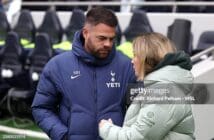
“I want to coach at the top level, and be a role model to people like me that you can reach levels we’ve never got to before.”
Marcus Renzi, 37, from Coventry, is now based in Cheltenham. He has four children and coached his young son’s side before setting up a reserve team. Alongside that, he used to play Basketball.
Seems normal, right? Quite the contrary.
Marcus has been pursuing his endeavours all from the constraints of a wheelchair, but the limitations he endures doesn’t limit his own potential.
He sat down with Prost International to discuss his story, and where he sees his future heading into the new 2021/22 campaign and beyond.
So Marcus, before we get into the nitty-gritty, could you give us a brief overview of your story and what makes it so unique?
“Of course. My name is Marcus Renzi, I’m 37 and based in Cheltenham.
“I moved to Cheltenham 21 years ago as I attended a college for the disabled, and have resided here since.
“I am the first person in a wheelchair in Gloucestershire to coach an able-bodied football team.”
In terms of your disability, how did it first come about and what was the effect on your childhood?
“When I was 11 years old, I was schooled in Coventry. I had a fight at school, well the term fight sounds quite bad as I’m in a wheelchair, but I went to punch this other child. He then punched me and I fell back on to the door frame.
“I was fine for 12 hours, no problems but the next day I fell into a coma.
“The doctor told my Mum that if I survived the night, I would never walk or talk again.
“Well. I can walk with aid and sometimes nobody can shut me up!”
Did you ever experience mental health difficulties in your early years of being in a wheelchair? And what was it like fitting in in an already tough teenage period?
“When I first went into a wheelchair, I felt very down about myself. It felt like my childhood had disappeared overnight.
“I would say I was like that until I was 17 when I came to college in Cheltenham. I came out of myself, and got into Wheelchair Basketball. I played that for 19 years, and was a coach for 14.
“We had a lot of chances at my college as it was just for those with disabilities we had more concentrated staff.
“One in particular, our fitness instructor, Paddy, he was amazing. He was the best member of staff though despite being unrecognised.
“Every night after his contracted work hours, he stayed there from eight o’clock till 11 in the evening. It’s people like him who need be recognised far more.”
Would you say Paddy inspired you to play Wheelchair Basketball, which you ended up doing for 19 years?
“He got the bug into me, definitely. When I first started playing Basketball, I couldn’t do a normal shot but through his sheer determination, he found a way to push me to new levels.
“Once I’d developed the basics, I got the power to shoot from anywhere around the three point line.”
What were the best moments in your Basketball career?
“When I played for Bristol Pirates, I played against a well-known wheelchair basketballer called Ade Adepitan, who now does some travel programmes on the BBC.
“I was told I had to mark him. Because I’ve only got the use of one hand, I am the slowest player on the court but I make up for it with my brain.
“With him, as he was ex-GB, there was no way I’d catch up with him. He just looked at me and said ‘three point swish’. He did it with such ease.
“That was probably the best moment, not because we won or I did anything special, but because it was so memorable.”
What were the difficulties in moving from playing to coaching Basketball?
“To be honest it was a very good transition. I loved doing it.
“Once when I had a coaching game in my Level Two, we were absolutely battering this team. Now I love putting the press on teams, so this was ideal.
“The opposing coach asked us to ease off a little bit, I just ignored it and said no. He then told my assessor, who then asked the same question.
“These were decent evenly picked teams, and even though my assessor asked I said ‘no’. If they were properly coached they would have been taught how to get out of it.
“Another highlight is that one of the girls I used to coach is now at Team GB level. For me, that’s the best feeling as a coach in whatever sport. When people achieve what they want to achieve at any capacity.”

Marcus in action
The main premise of the article is about your footballing exploits. How did you make the move from Basketball to a very different world in the beautiful game?
“When I was at the end of my Basketball career effectively. My bones creaked and, well, it was a natural feeling of getting old.
“I’ve got four children, and my eldest started to get interested in football. I supported him, and made a little mistake by telling the Chairman that I couldn’t walk (which I can)!
“On the presentation day, the Chairman spotted me and said immediately he would be getting me into my level one. I really enjoyed it.
“I got into coaching my son’s football team, and we played 14 games last season. Unfortunately, we lost them, but I had six players poached from my team (obviously the strongest).
“The way I see it, it’s a testament to my coaching that we had so many great players who’d improved.”
As a coach, what would you say are your best qualities?
“I’d say I’m a great listener. If they’re struggling with things, I help them out the best that I can. If they want one-to-one sessions, I’ll do it.
“I never ever cancel a training session come rain or shine. I’ll always be there for the boys but now, I’ve been given the Men’s reserves.
“It was with a heavy heart but I was happy about how I’d had been asked to do it.
“I’ve gone from no players around six weeks ago, to now having 21 registered players and an assistant manager as well.
“We just had our first friendly against a second division team, who are one above us, and drew 2-2. It’s a really positive moment.”
In terms of disabled coaching, it is a huge rarity to see them coaching able-bodied people. Is this something you’d like to spearhead locally, nationally and internationally?
“This is why I’m doing it. I think I could be a role model to many aspiring disabled coaches and that really inspires me.
“In the country, I only know of two other people in the same situation as me. They’re up north in the Manchester area, and as far as I know there isn’t any others.
“I want to go international. I want to be the first person in a wheelchair in the whole world to coach a professional football team. It may sound ridiculous, but people can do anything if they put their mind to it.”
Who are your biggest inspirations?
“Paddy has to be one, as I’ve already said. Another one is a good friend of mine Mark Fosbrook, who played Basketball for GB as well as wheelchair Rugby.
“As a coach I love to look up to Pep Guardiola. He knows how to get the respect of the players and respect them back, meaning they want to work for him.
“Also with a heavy heart as I’m not a fan of Manchester United, Sir Alex Ferguson.”
Finally, where will Marcus Renzi be in five years?
“Well I’m doing my UEFA B License next year, which is great. I’m not going to say that I will be a Premier League manager, but I’d love to say I’d be in the EFL.
“I’d love to show that it can happen. I’ve recently been speaking to Forest Green Rovers, who have started to back me, putting me in touch with their academy head.
“I’ve had an email from her, she’s invited me to come to watch the first team train, then hopefully I can develop a relationship with them and all will be good!”
Follow us on Twitter @ProstInt
![Prost International [PINT]](https://prostinternational.com/wp-content/uploads/2021/08/PINTtFontLogoRoboto1536x78.jpg)


